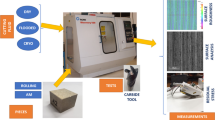Abstract
Steel components often have to be machined after heat treatment in order to obtain the correct shape as well as the required surface finish. Hard turning allows manufacturers to simplify their processes and still achieve the desired surface finish quality [1]. Surface integrity involves study and control of two factors, surface roughness and surface metallurgy. The study of surface metallurgy entails the investigation of the possible alteration in the surface layers after machining such as plastic deformation and residual stress distribution. The residual stresses that can be found in a mechanical component are mainly generated in the final steps of the machining process. The level of the generated residual stresses depends on the machined material and on the process parameters used [2]. The effects of residual stress may be either beneficial or detrimental, depending upon the sign, magnitude and distribution of the stress, all of which can be critical to performance and have to be considered in the design of a component [3]. In this study the residual stresses were measured using the blind hole drilling method in axial and circumferential directions. The goal of this work is to identify a relationship between surface integrity, turning process parameters and fatigue behavior of components. Figure 1 shows the geometry of the round specimens studied in this work.
Access this chapter
Tax calculation will be finalised at checkout
Purchases are for personal use only
Similar content being viewed by others
References
Vernon, A. and Özel, T., Factors affecting surface roughness in finish hard turning, Department of Industrial and Systems Engineering, Report No. 03-104, 2003.
Dahlman, P., Gunnberg, F. and Jacobson, J., Journal of Materials Processing Technology, vol. 147, 181–184, 2004.
Grant, P.V., Lord, J.D. and Whitehead, P.S., The Measurement of Residual Stresses by the Incremental Hole Drilling Technique, NPL, Teddington, United Kingdom, 2002.
Schajer, G.S., J. Eng. Mat. Tech., vol. 110, 338–343, 1988.
Author information
Authors and Affiliations
Editor information
Editors and Affiliations
Rights and permissions
Copyright information
© 2007 Springer
About this paper
Cite this paper
Javidi, A., Rieger, U., Eichlseder, W. (2007). The Effect of Machining on the Surface Integrity. In: Gdoutos, E.E. (eds) Experimental Analysis of Nano and Engineering Materials and Structures. Springer, Dordrecht. https://doi.org/10.1007/978-1-4020-6239-1_90
Download citation
DOI: https://doi.org/10.1007/978-1-4020-6239-1_90
Publisher Name: Springer, Dordrecht
Print ISBN: 978-1-4020-6238-4
Online ISBN: 978-1-4020-6239-1
eBook Packages: EngineeringEngineering (R0)



